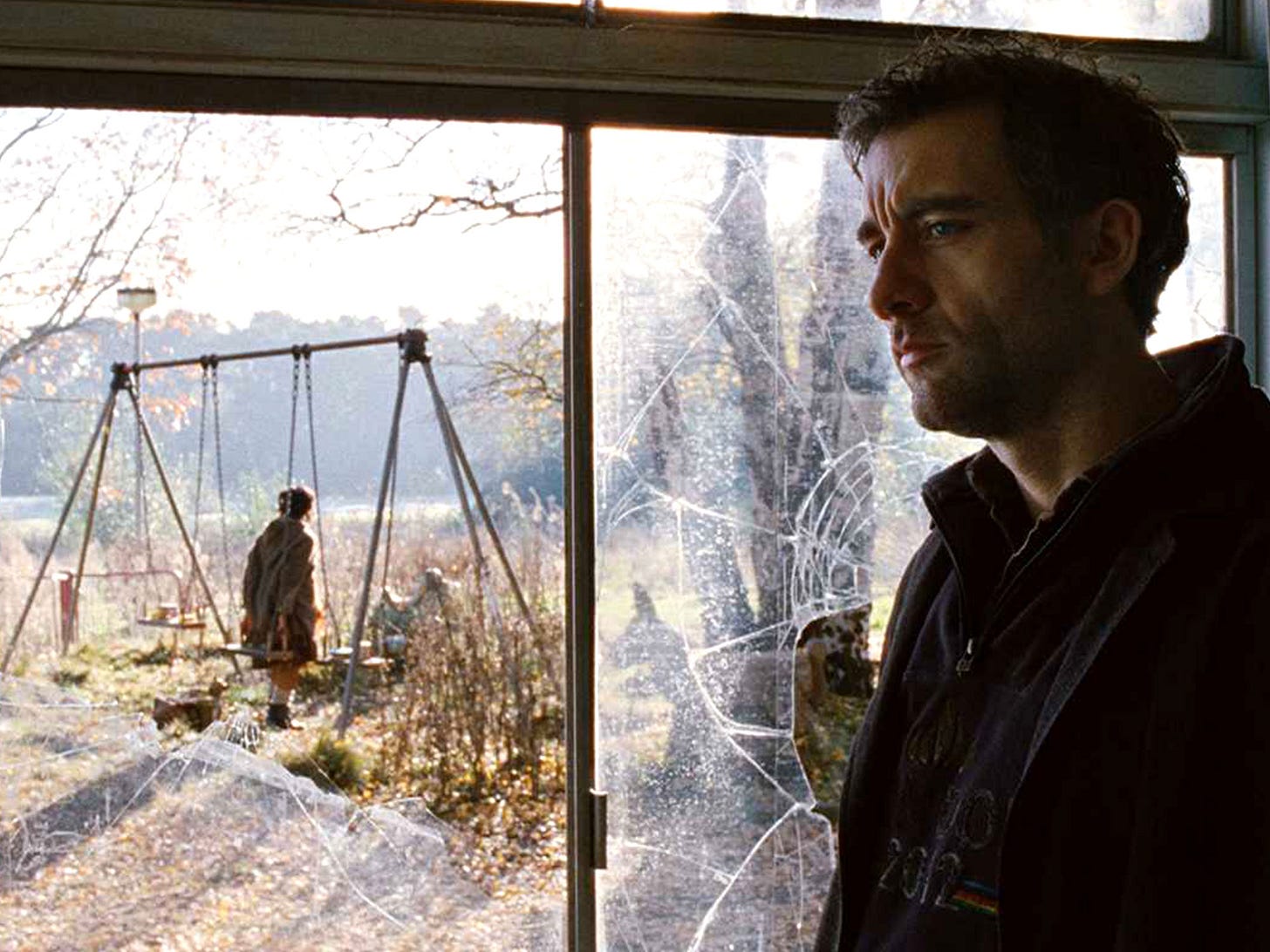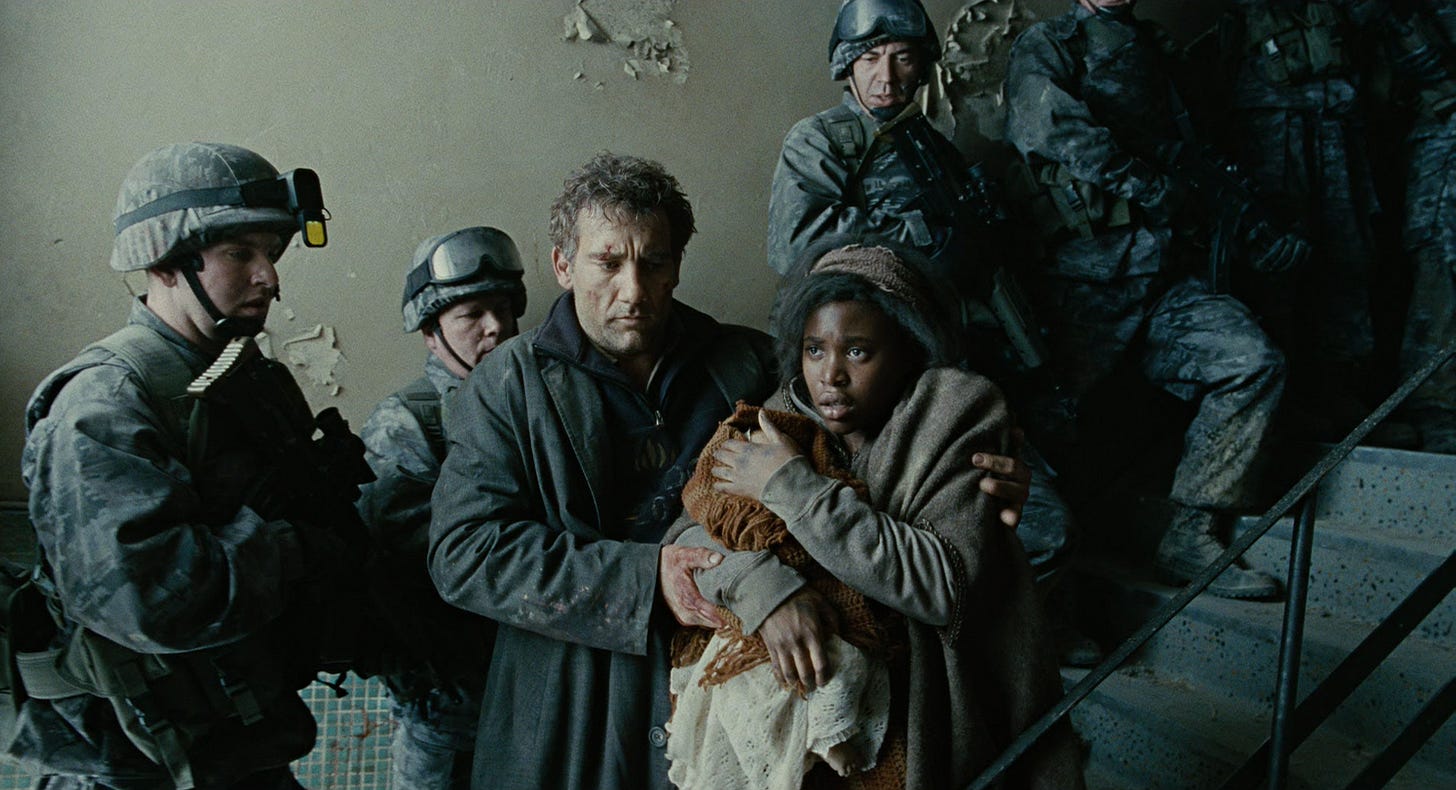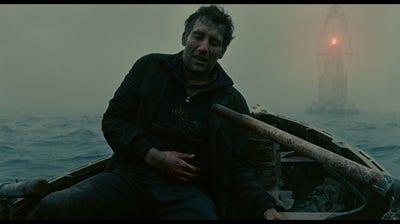The Favourites
Children of Men
In 2007 the last human was born. Twenty years later, a world shuffling towards extinction continues, no light at the end of the tunnel, unsure why they remain here. No children. No future. This is the setup of Alfonso Cuaron’s 2006 dystopian masterpiece Children of Men. Thrust into this hopeless world, we meet Theo (Clive Owen), a disillusioned former activist who, after losing his son years prior, has settled into a quiet, rotting existence. When his ex-wife Julian (Julianne Moore) requests his help in securing the travel of an illegal immigrant, Theo is thrust into a plot of betrayal, intrigue, and, ultimately, hope. And while it takes the entire film for Theo to fully embrace the potential of tomorrow, the film ends with a dream that the sun will rise on a better day.
At the start of the film, Theo (like most people in the film) has lost all hope for the future. He passes his days in a near-drunken stupor, the only highlights being visiting his one and only friend Jasper (Michael Caine) who lives in a secret forest compound with his catatonic wife. He is drifting, listless in a dying world. He rejects the initial call to action Julian puts forth because for Theo there appears to be no fight left. A once-promising activist, the death of his son not only ended his relationship with Julian but his pursuit for bettering the world altogether. Theo’s tragedy acts as a microcosm for the tragic situation of the entire world. The world has lost its children, and with it, all will to live is slowly draining from it with each passing day.
You see, Theo's faith lost out to chance. So, why bother if life's going to make its own choices?
But there is still fight, both in the world and in Theo, even in the beginning when it seems all hope has been lost. We can see this fight in the world in general. Despite the borders being shut down and the government of Britain enforcing strict martial law, people from other countries still flood the island nation. They come to Britain because they need to believe that something is better, they need to believe that there is a better life. These refugees refuse to stop fighting, refuse to go quietly into that good night, even though they are the final generation. There is hope for the future, even if that future is just one day more.
Theo’s initial gleams of hope lie in his friendship with Jasper. Jasper and Janice (Philippa Urquhart) are both former journalists, their walls adorned with articles and photos from their days in the field. Janice’s catatonic condition is a result of torture she endured by the fascist government still in control of the country. They both seem to represent the world before the fall, of the hopes now since forgotten. Yet Theo sees them frequently, and here he can joke and laugh like nowhere else. He even becomes distraught when he sees Jasper owns a Quietus kit, a popular suicide kit for people who have given up. Despite Jasper and Janice representing both the world before and the terrible way of the world now, Theo hopes to not lose them. Although this is just a small amount of courage in a dying world, it’s what allows him to go on the eventual journey he does throughout the film.
A wicked alternative to hope is seen in the scene with his cousin Nigel (Danny Huston). In an attempt to gain travel papers, Theo visits his cousin, a high-ranking member of the government. Nigel spends his days working on a project called the “Ark of the Arts”, a massive collection of the most important artwork from human history. The scene contrasts the government’s treatment of art to its treatment of people, as these works are kept in pristine condition, a collection kept clean only to rot when the final man dies. Theo asks Nigel what keeps him going, to which he replies “I don’t think about it.” This isn’t hopelessness, it’s apathy, a man of immense power simply shutting out the world around him. While the people of the street shut down due to the overwhelming nature of the situation, Nigel and those in power shut down only because it would be inconvenient for them to care.
I can't really remember when I last had any hope, and I certainly can't remember when anyone else did either. Because really, since women stopped being able to have babies, what's left to hope for?
Theo is craving for more, he craves to believe and to have hope. While it is a dangerous thing to hold hope in a truly hopeless situation, Theo wants to believe in a better tomorrow. He speaks with Jasper about the Human Project, a near-mythical group that is attempting to solve the reproduction crisis. The Human Project is the ultimate hope, a silent, unseeing thing that represents what humanity can accomplish if only we put our differences aside. Theo speaks with derision about such a project, yet is still willing to risk his life to deliver Kee to them. He projects nihilism but is never able to commit to such a dismal thing, and his basic instincts to want more override what a more analytical mind would deem impossible. It’s not through politics or pure logic that humanity shall carry on but by emotion and heart.
The film is laced with layers of symbolism, both obvious and not. The boat that Theo and Kee are attempting to reach is Tomorrow, something this society is striving for every day. Kee herself is ultimately the key to solving the fertility crisis. When discovering the pregnant Kee, Theo finds her in a barn beside a manger, a nearly religious experience. Theo is much like the Catholic Saint Theo, the patron saint of soldiers, lost artifacts, and for whom you pray to against storms. Our hero Theo is a soldier, reluctant but battle-ready, recovering the artifact that was the world before. While Saint Theo died of immolation, our Theo is on the edge of death upon the water. They reach Tomorrow only because of the blood shed by Theo, and if he were to die in these closing moments, his martyrdom would be sealed in the new world. Religion is the ultimate leap of faith, and it’s in faith that this world can conquer the fear that is an unknown tomorrow.
Not that the film has any love for religious fanatics or fanatics of any variety. The few people we see praying throughout the film are pitiful, self-flagellating, and tortured for their sins. They don’t use religion as a way to seek a better way forward but as a punishment for things that have already happened. Meanwhile, the Fishes (the political activists who recruit Theo for his mission) are equally lost. They wish to use Kee’s baby as a political tool, completely abandoning the notion of it being a child. They never speak of how they would use the child, or what they would do with Kee after she gives birth. They, much like the religious fanatics, are short-sighted, hoping to correct small slights compared to the grander vision of the world. Their inability to see the baby as even human is what leads to their failure, for they have lost sight of what they were initially fighting for.
As the sound of the playgrounds faded, the despair set in. Very odd, what happens in a world without children's voices.
Director Alfonso Curan’s use of the long take plays into the theme of hope threaded throughout the film. Audiences through years of film viewing become expectant of cuts, and by withholding these from the audience Curan builds a natural tension in the scenes. They become more real, more vibrant than expected. This can lead to visceral reactions, such as in the assassination of Julian. It can build suspense, as in the scene of Theo, Kee, and Mirian (Pam Ferris) escape from the Fishes on the farm. In the birthing scene, the uncutting camera takes on the role of the spectator, unable to help in any way, forced to pace about until what will happen happens. The suspense in these scenes forces the audience to a place of prayer, of hope, and by not cutting we are made to hold our breaths, living completely within the scene.
The most well-known single take in the film links not just the theme of hope, but is a microcosm of the entire film and what we can expect after the credits roll; the Miracle in Wartime. In this scene, Theo and Kee get separated by the Fishes as they try to make their way to the rowboat that would get them to Tomorrow. The government is sending troops into the Bexhill camp they are in, and a massive firefight breaks out between the Fishes, the government soldiers, and the immigrants who are caught in the crossfire. Theo breaks away from his captors, running through the chaos of the war-torn area, and rescues Kee from the Fishes. As Theo and Kee descend from the crumbling complex, her baby begins to cry. The wails of the baby echo throughout the battlefield, silencing guns, as residents and soldiers part to let our heroes through. The shocked silence of the crowd is only broken when a missile strikes after Theo and Kee have reached safety outside the building. As they head to their boat, wailing child with them, the fighting resumes.
Here we can see the entire film play out. Our hero, Theo, escapes death (one by the hands of complacency, one by the Fishes) and travels across a bitter and dangerous land in order to save a woman and her child. This child then acts as the hope for the entirety of the world. Everyone stops, reaching out to the child, not just wanting but needing it to exist. These people will be forever changed by this moment, a shock to a system that had long ago faded into dull despair. We are led to believe that this is it, that the moment this child enters the world we are safe, that humanity is healed. But while we are better, life is never that simple, and the war wages even after the miracle. This is not a hopeless ending, but a bittersweet one. We can live on, we can be saved, but that doesn’t mean our horrors will end. Hope is not a cure, but it is still worth the moments of grace it allows us.
We end the film in the warm embrace of hope. Kee and her baby (newly christened Dylan, after Theo’s son) reach Tomorrow. Theo, though on the verge of death, has redeemed himself, regaining the sense of purpose long lost since his son died. And we the audience also leave with hope, hope that if we may not change the world, our children might. And if not them, their children. There are generations of us, people upon people, and in that hoard of humanity, we must place the world and all its glory. For if we’re not living for the future, the maybes, then we might not be living at all.







